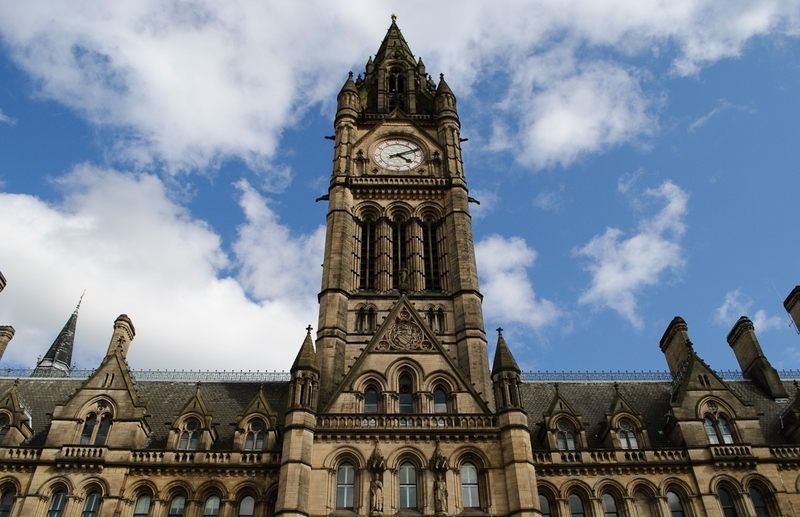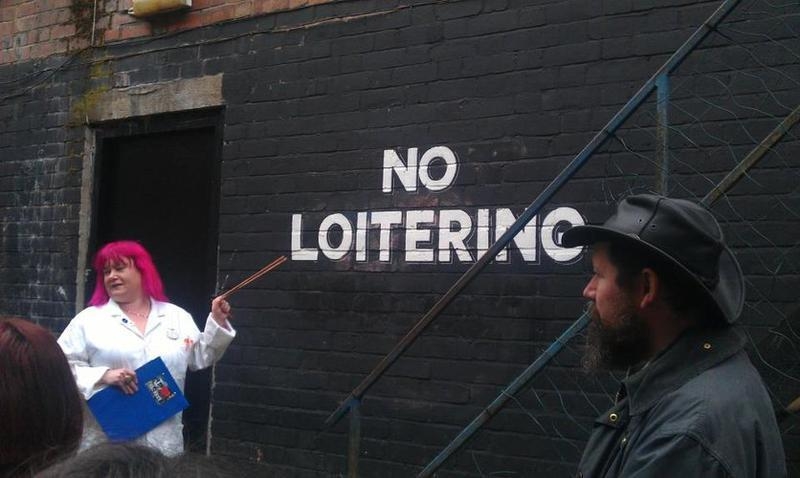Andrea Sandor investigates the PSPO plans that could see the Council in court
After nearly a year, Manchester City Council finally looks ready to make a decision about its proposed ‘public space protection order’ (PSPO).
PSPOs give local authorities power to prohibit certain behaviours within a designated area or receive a £100 fine on-the-spot, increasing to £1,000 in court if unpaid. While the most controversial element of it - ‘aggressive begging’ - has been removed, critics argue it still discriminates against homeless people. Critics include some homeless people themselves.
Kathleen Cosgrove is a solicitor at Greater Manchester Law Centre (GMLC) specialising in housing and homeless matters. She says:
“The majority of my clients are or have been homeless and some have already expressed concern about the proposals and said they would like to take action if the clauses are brought in.”
The worry about using new powers flexibly is that certain people may be unfairly targeted
‘Meet the homeless person suing Manchester City Council’ is a compelling headline, but we shouldn’t have to get to that place.
The Council contend the PSPO wouldn’t be used against homeless people, saying “The Council is clear that its overriding priority is to support vulnerable people which includes people who are begging (and who in some cases are also sleeping rough.) … The proposed PSPO is targeted to address specific anti-social behaviours which are unacceptable – people will absolutely not be fined because they are sleeping rough or homeless.”

Some see it otherwise. Opposition councillor Richard Kilpatrick says:
“The Council have now been warned in the strongest possible terms that the proposal and the consultation are likely to be unlawful and discriminatory. This must stop now. We must seek to provide humane solutions to the complex problems of drug addiction, lack of mental health treatment, and entrenched rough sleeping.”
So let’s take a closer look at the PSPO and why it remains so controversial.
Manchester’s proposed PSPO
Back in February an eight-week consultation was launched on the PSPO, which was immediately branded a “homeless tax” and opposed by groups such as Greater Manchester Law Centre, Liberty, Greater Manchester Housing Action and the Liberal Democrats due its proposed ban on ‘aggressive begging’.
They had reason to be concerned. In May 2018, The Guardian reported hundreds of homeless people had been fined and imprisoned in England and Wales by councils using PSPO powers. This despite councils overwhelmingly arguing their PSPOs were meant to target anti-social behaviour, not the homeless.
The Council have since removed ‘aggressive begging’ and presented a new draft to the Communities and Equalities Scrutiny Committee last week.
The behaviours included in the council’s new draft include prohibitions against:
- urinating or defecating in public,
- disposing of syringes and needles in public unless in a sharps container,
- consuming alcohol in a public space other than a licensed area.
It also includes requirements to disperse in a timely manner if:
- occupying a tent or similar structure considered to be a health hazard
- obstructing a doorway, exit, stairway, footpath or road.
The PSPO also includes less controversial clauses related to commercial waste.
The PSPO will be enforced by the anti-social behaviour action team (ASBAT) and police, the Council have confirmed to me. They have also provided reassurance that enforcement will not be outsourced, although this wasn’t stipulated in writing in the draft PSPO.
Similarly, while the Council say “people will absolutely not be fined because they are sleeping rough or homeless”, this wasn’t stipulated in writing either.
Read - Manchester's aggressive beggars should be fined
Does the PSPO discriminate against rough sleepers?
According to Cosgrove: “The most problematic clauses are the obstruction and the tents. However, the alcohol, urination/defecation and needles will also discriminate against homeless people (because they haven’t got access to toilets, safe ways to dispose of needles, or place to drink alcohol at home).”
The Council will be extending the hours of the public toilets at the Town Hall to 24/7. While this is a positive move, surely we need more public toilets and can’t expect people to trek across town in the middle of winter for a nighttime wee. Unless, of course, the ambition is to attract rough sleepers to bed down for the night in front of the Town Hall?
In terms of tents and obstruction, it’s interesting to note that neither tents nor obstruction got majority support in the consultation survey.
Of the respondents, 54% disagreed with the statement that tents should be included in the PSPO, and, statistics-wise, significantly more ‘strongly disagreed’ than ‘strongly agreed’ (38% vs 33%). Additionally, 51% disagreed with this statement regarding obstruction, with a similar proportion strongly disagreeing as agreeing (there was no significant difference).
However, the Council have said two-thirds support the obstruction requirement because they agreed ‘those responsible for enforcing the PSPO should have the power to require someone to’ move if obstructing the way. But how can 66% support enforcement of a requirement when only 49% said it should be included in the PSPO?

I’m starting to see why Dr Morag Rose, academic at Liverpool University, criticised the consultation at last week’s scrutiny committee, saying she would flunk it if it were a undergrad project.
Rose and Cosgrove both argue the survey asks leading questions. Researchers prepare to cringe: the first question asked of each behaviour is ‘How problematic do you think this is in Manchester city centre?’
Cosgrove has called the consultation unlawful. She argues respondents weren’t adequately informed as to the risks and consequences of the PSPO, meaning they couldn’t make an informed decision when answering the questions.
Crucially, she argues the people most vulnerable to the PSPO - homeless and rough sleepers - weren’t consulted because the consultation was online.
In an open letter to the council, 58 organisations concerned with homelessness came together to urge the council not to pass the PSPO. As part of their objection, they gathered feedback from homeless people. As you would expect, the homeless people they spoke to don’t support the PSPO and feel it’s targeted at them specifically.
Read - Fining Manchester's beggars is not the answer

Are the new powers necessary?
There appear to be several potential issues with the PSPO and consultation it’s based on. Does the Council definitely need new powers to help tackle the anti-social behaviour problems everyone’s aware of in the city centre?
When asked for the need of new powers, the Council said:
“The condition relating to on-street drinking is renewing an existing power which is about to lapse. In some other cases - for instance ... to move within a reasonable time if asked to do so when obstructing fire exits and other entrances to buildings - there are no existing powers which specifically address these issues.
“In other cases, where behaviours may be covered by existing powers these powers can be slow and cumbersome to use and the PSPO powers will enable a more flexible, appropriate and proportionate response.”
Cosgrove, however, disagrees:
“Some of the existing powers with regard to anti-social behaviour may be slow and cumbersome,” she says, “for example civil injunctions, criminal behaviour order and community protection orders, but that is because they have safeguards against misuse and issuing penalties unfairly or unlawfully i.e. a fair trial, and proper consideration by the court about what kind of order would be most appropriate and effective.”
She also points me to a number of more immediate powers available. For example, the police already have powers to issue dispersal orders requiring an individual or groups in a specified area to not return for 48 hours and to bind over or arrest for public order offences.
Under s87 Environmental Protection Act, the Council already have powers to issue spot fines for anyone dropping a needle, or defecating and urinating on the streets.
The Highways Act 1980 gives the council power to issue spot fines for people obstructing pavements and can require property owners to ensure doorways open inwards to ensure they’re not blocked in the event of a fire.
Cosgrove is also concerned about the “flexibility” of the PSPO, which she says means “enforcing [powers] against some people and not others”:
“The worry about using new powers flexibly is that certain people may be unfairly targeted.”
She says general guidance about spot fines is they should be enforced consistently and in conjunction with other measures to ensure people can avoid being fined - for example adequate provision of public toilets or sharp bins.
Will the PSPO work?
There’s increasing reason to believe the PSPO won’t make a difference. Southampton Council scrapped a similar PSPO earlier this year; since it was introduced in 2016, 32 fines were issued but only one was paid.
Community wellbeing councillor Dave Shields said: "(The PSPO’s) not working and we would rather focus on the things that will work."
Oxford City Council decided not to renew a similar PSPO this year, which had led to four fines being issued and one prosecution over two years.
Bournemouth Council is reviewing a similar PSPO in light of legal action brought against it by a resident.
There’s a good chance the PSPO wouldn’t make much difference and would be a misuse of resources. At the same time, there’s a risk it would have a negative impact on vulnerable people and undermine trust with the Council. If passed in its current guise, the PSPO will very likely result in the Council being taken to court.
Since going to the Scrutiny Committee, the decision now rests with the Strategic Director of Neighbourhoods, Fiona Worral, in consultation with Deputy Leader Nigel Murphy, who defended the PSPO at scrutiny.
I have to ask myself why the Council keeps finding itself in the position where local groups and individuals feel they have to resort to legal action. The ‘Trees Not Cars’ group are taking legal advice at the moment to contest a fiercely opposed council planning decision, and members of the public have asked for an internal review regarding the controversial Great Ancoats Street scheme.
It feels like unpopular decisions continue to be steamrolled through. Will the PSPO break that pattern?














